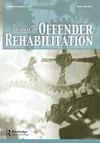重新进入社会和停止犯罪的观点:一般犯罪和性犯罪的比较
IF 1.1
Q3 SOCIAL WORK
引用次数: 0
摘要
摘要尽管有大量关于从惩教设施释放后再犯的文献,但尚不清楚这种缓刑过程是否因罪犯类型而异。具体而言,被判性犯罪(ICSO)的个人在返回社区后可能会面临独特的挑战,因此,探索ICSO过渡到社区并保持无犯罪的计划与被判一般(非性)犯罪(ICGO)的个人有何不同是很重要的。为此,本混合方法研究旨在探索ICSO和ICGO对出狱后重返社会和退出监狱的看法。男性ICGO(n = 139)和ICSO(n = 106名即将从最高安全级别监狱获释的囚犯就他们的罪行和获释后的期望接受了采访。总体而言,ICSO和ICGO报告了类似的重返社会准备水平和退出障碍(例如负面影响、就业/上学)。然而,ICSO预计很难遵守限制,这可能是由于他们在获释时受到独特立法的影响。总的来说,这项研究阐明了规划和过渡服务的重要性,以使那些从惩教设施获释的人,特别是那些被判性犯罪的人,在返回社区时可能面临额外的障碍。本文章由计算机程序翻译,如有差异,请以英文原文为准。
Perspectives of reentry and desistance: a comparison of individuals convicted of general and sexual offenses
Abstract While there is a wealth of literature on recidivism following release from correctional facilities, it remains unclear whether this desistance process varies across offender types. Specifically, individuals convicted of sexual offenses (ICSOs) may face unique challenges upon return to the community and thus, it is important to explore how ICSOs plans for transitioning to the community and remaining crime free differ from individuals convicted of general (non-sexual) offenses’(ICGOs). To this end, the present mixed-methods study aimed to explore both ICSOs and ICGOs perceptions of reentry and desistance upon release from prison. A sample of male ICGOs (n = 139) and ICSOs (n = 106) nearing release from a maximum-security prison were interviewed about their crimes and expectations upon release. Overall, ICSOs and ICGOs reported similar levels of preparedness for reentry and obstacles to desistence (e.g., negative influences, employment/schooling). However, ICSOs anticipated difficulty complying with restrictions, which may be a result of the unique legislation they are subject to upon release. Overall, this study sheds light on the importance of programming and transition services to prepare those being released from correctional facilities for reentry, particularly those convicted of a sexual offense who may face additional barriers when returning to their communities.
求助全文
通过发布文献求助,成功后即可免费获取论文全文。
去求助
来源期刊

Journal of Offender Rehabilitation
SOCIAL WORK-
CiteScore
1.60
自引率
0.00%
发文量
24
期刊介绍:
The Journal of Offender Rehabilitation is a multidisciplinary journal of innovation in research, services and programs in criminal justice and corrections. The journal is an essential professional resource for practitioners, educators and researchers who work with individuals involved in the criminal justice system and study the dynamics of rehabilitation and individual and system change. Original research using qualitative or quantitative methodology, theoretical discussions, evaluations of program outcomes, and state of the science reviews will be considered.
 求助内容:
求助内容: 应助结果提醒方式:
应助结果提醒方式:


